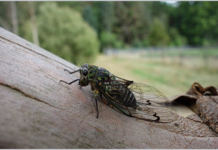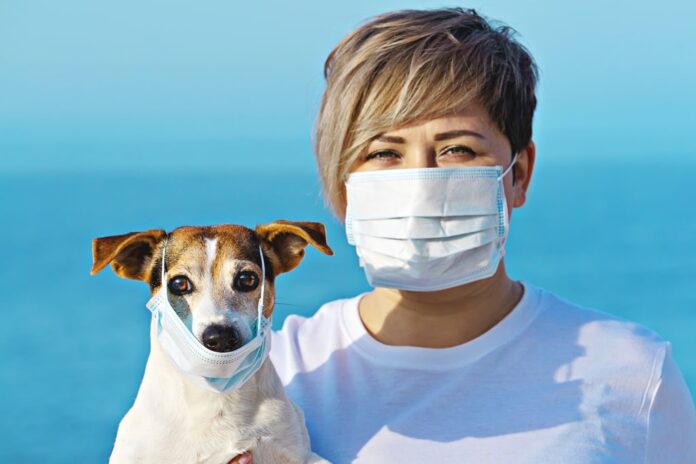The coronavirus is now on the lips of all news readers across the planet. The epidemic that started in Wuhan is particularly raging in China at the moment. It is actually caused by 2019-nCoV, a virus belonging to the genus coronavirus.
Perhaps you have followed the news and know that a large number of animal owners in China are now arming their dogs with a face mask to protect them from being infected by this virus.
Is it really necessary? Have you even thought about it?
The large family of coronaviruses includes around 40 different viruses and some can actually infect cats and dogs. But what about the dreaded 2019-nCoV (or COVID-19)?
HOW DOES CORONAVIRUS MANIFEST IN HUMANS?
The new 2019-nCoV coronavirus strain can severely affect some people and cause their death. This new coronavirus causes damage to the respiratory system and has the following symptoms:
- Cough
- Fever
- Shortness of breath
Similar to the flu virus, the symptoms may be minor for some and severe for others, depending on how effective their immune system is at fighting the intruder.
In immunocompromised people, a secondary bacterial infection (pneumonia, for example) can develop and complicate their state of health.
CORONAVIRUS (CCOV) IN DOGS
Can my dog get coronavirus? Although possibly safe from the well-known 2019-nCoV coronavirus, your dog can catch other strains of coronavirus.
In fact, a dog can contract a canine coronavirus which affects the respiratory system (CRCoV) and two other types of coronaviruses which infect the digestive system (CCoV type I and II). If you’re worried about your dog contracting coronavirus, try and walk them in large areas to keep them away from other dogs and people. You could also look at buying an outdoor dog kennel so your dog can sleep outside in the fresh air. This is completely optional though. The best place for your dog (or cat) to be is outside. This limits the chance of them catching the coronavirus since they’re in the fresh air, rather than being in a potentially contaminated house.
THE “RESPIRATORY” CORONAVIRUS IN DOGS (CRCOV)
This is part of the kennel cough complex. In other words, when a dog contracts kennel cough from contact with another dog or with a contaminated surface, it catches both this virus (or another), as well as a bacteria (Bordetella bronchiseptica). These act together and cause respiratory problems. This infection is very contagious between dogs.
THE “INTESTINAL” CORONAVIRUS IN DOGS (CCOV TYPE I AND II)
This also causes a very contagious infection, especially in puppies. It mainly causes diarrhea, but is generally without serious consequences. However, it can be dangerous when combined with another disease such as parvovirus.
WHAT ARE THE SYMPTOMS OF CANINE CORONAVIRUS?
The symptoms vary depending on the type of infection, as mentioned above. Here is a list of coronavirus symptoms in dogs according to the type of canine coronavirus.
SYMPTOMS OF “RESPIRATORY” CORONAVIRUS:
- Hoarse cough
- Shortness of breath
- Difficulty breathing
- Decreased energy
SYMPTOMS OF “INTESTINAL” CORONAVIRUS:
- Diarrhea
- Soft stools
- Loss of appetite
- Vomiting (often only once)
- Decreased energy
- Fever (rare)
There is a coronavirus vaccine for dogs for the intestinal coronavirus. However, there is no agreement on it in the veterinary world. This virus mainly affects young puppies. Dogs old enough to be vaccinated are therefore less likely to get the virus.
CAN CORONAVIRUS IN DOGS SPREAD TO HUMANS?
According to current knowledge, dogs cannot transmit coronavirus to humans, regardless of the type (respiratory or intestinal).
However, it can transmit other types of viruses, bacteria or fungi. So, if you are unsure about your dog’s diagnosis, it’s best to check with a vet in order to limit the risk of transmission.
CAN THE CORONAVIRUS BE TRANSMITTED TO DOGS AND CATS?
This question has not yet been studied by scientists as the phenomenon is very recent. It is therefore difficult to answer with certainty.
However, I can tell you that no case of 2019-nCoV infection in dogs and cats has been officially reported to date. Your dog, therefore, does not need a face mask to protect itself from it. Only pet owners will need to wear a face mask when out to protect themselves against the virus. There are plenty of websites, like customlanyards4all, which sell face coverings to protect humans from the virus.
On the other hand, as it is a virus which has the capacity to mutate, and as we still know little about it, it is recommended to use precaution and to avoid contact with animals presenting influenza symptoms, especially in Chinese regions.
CORONAVIRUS (FCOV) IN CATS
Can my cat get coronavirus? As mentioned above, your cat probably cannot catch the well-known 2019-nCoV coronavirus, which affects humans.
However, it is vulnerable to feline coronavirus (FCoV). This virus can take many forms and can be mild or fatal.
FELINE “INTESTINAL” CORONAVIRUS (FECV)
What is coronavirus in cats? The first form of feline coronavirus (FECV) is called feline enteric coronavirus (intestinal) and can cause digestive upset and symptoms such as diarrhea and sometimes vomiting. It is considered mild and is often asymptomatic (without symptoms).
The coronavirus is transmitted very contagiously via stools and saliva. Cats living in communities or sharing a litter box, as well as cats that move about outside are therefore at greater risk of catching this virus.
FIP CATS
Coronavirus in cats becomes worrisome when it causes feline infectious peritonitis (FIP).
What is FIP in cats? Following errors in its replication, the coronavirus undergoes what is called a mutation. It therefore changes from the “intestinal” form to a new form that can cause this very dangerous disease.
How do cats get FIP? The coronavirus in question is mainly transmitted through the stool (oral-fecal contact), but also via aerosols (much like the flu).
Feline infectious peritonitis can progress in two ways, either to a wet or dry form. Among other things, wet FIP results in an accumulation of fluids in the abdominal cavity or chest, which, as you might expect, is not good news.
SYMPTOMS OF CORONAVIRUS IN CATS (FELINE INFECTIOUS PERITONITIS)
Above all, feline infectious peritonitis (FIP) is difficult to diagnose, as a result of its classic symptoms during the early stages. A cat may first lose its appetite, have a fever and be lethargic. A cat with FIP will not improve following antibiotic treatment.
SYMPTOMS OF THE WET FORM OF FELINE INFECTIOUS PERITONITIS (FIP)
Depending on the organs affected, a cat can have different symptoms:
- Accumulation of fluid in the chest can cause breathing problems
- If the digestive system is affected, it may suffer from diarrhea or vomiting
- Weight loss
- Swollen abdomen
SYMPTOMS OF THE DRY FORM OF FELINE INFECTIOUS PERITONITIS (FIP)
The dry form of the disease can affect other organs or systems, such as the eyes, liver, nervous system, or kidneys. Here are some examples of the symptoms of FIP in cats:
- Kidney infection
- Renal failure
- Uveitis
- Vomiting
- Liver failure
- Seizures
- Paralysis
As you can see, the symptoms of cat FIP are very varied, which makes its detection difficult. A definite diagnosis can only be made post-mortem. Some tests do exist, however, to help the vet distinguish feline infectious peritonitis from other diseases.
To sum up, there is currently no evidence that your pets are at risk of contracting the well-known 2019-nCoV coronavirus. That said, this is not the case for all coronaviruses.
Dogs can catch some forms of coronavirus, causing digestive or respiratory problems. As for cats, they can contract a mild intestinal form of coronavirus, but this can develop into a potentially fatal disease, namely feline infectious peritonitis (FIP cats).
So, there is no need to put a mask on your dog’s face, but it is still wise to use prevention strategies to avoid the transmission of coronaviruses other than 2019-nCoV.
Story credit to HomeoAnimal.
Photo credit to HomeoAnimal.






































